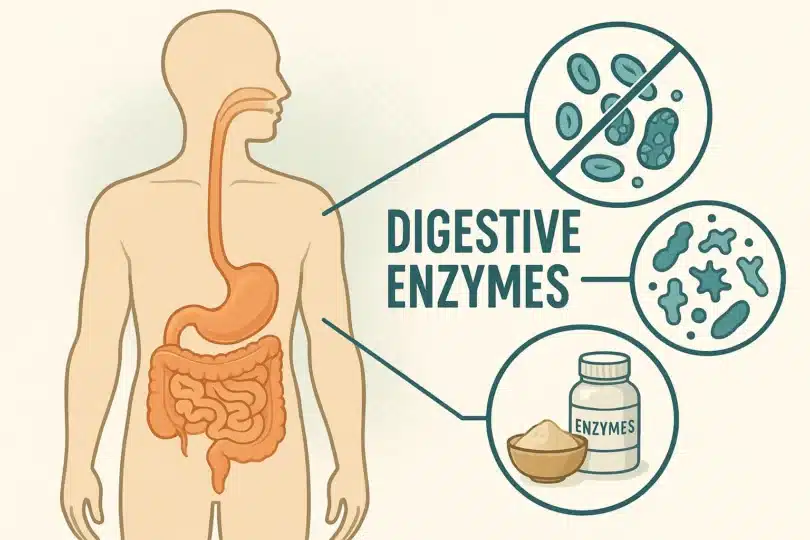Digestive issues like bloating, gas, and indigestion are among the most common health complaints worldwide. Many people turn to supplements for relief, and one of the fastest-growing options is digestive enzymes. These supplements claim to help the body break down food more efficiently, improve nutrient absorption, and ease discomfort. But do they really work, and who actually benefits? In 2025, digestive enzymes remain a popular yet sometimes misunderstood remedy. This article breaks down how they work, what the evidence shows, and how to use them wisely for better gut health.
What Are Digestive Enzymes?
Digestive enzymes are proteins that speed up the breakdown of food into nutrients the body can absorb. The pancreas naturally produces enzymes like amylase (for carbs), lipase (for fats), and protease (for proteins). Additional enzymes are present in saliva and the stomach. Supplements are designed to provide extra support when the body struggles to produce enough or when certain foods are harder to digest.
How They Work
Enzyme supplements typically come from animal (pancreatic enzymes) or plant sources (such as bromelain from pineapple or papain from papaya). They help break down macronutrients more efficiently, reducing strain on the gut. For example, lactase supplements target lactose intolerance by breaking down milk sugar, while lipase can help digest fatty meals.
Who Benefits Most?
- People with pancreatic insufficiency: Conditions like cystic fibrosis or chronic pancreatitis impair enzyme production, making supplements essential.
- Lactose intolerance: Lactase pills allow many people to enjoy dairy without discomfort.
- Older adults: Natural enzyme production may decline with age, leading to slower digestion.
- Individuals with chronic bloating or indigestion: Supplemental enzymes may ease symptoms, though results vary.
Do They Really Work?
Research supports digestive enzyme use in people with deficiencies or specific intolerances. For general bloating or “weak digestion,” evidence is mixed. Some users report significant relief, while others notice little difference. Effectiveness depends on the type of enzyme, dosage, and the cause of digestive issues. Enzymes are not a cure for underlying conditions such as irritable bowel syndrome (IBS), but they may provide symptom relief.
Types of Digestive Enzymes in Supplements
- Amylase: Breaks down starches into sugars.
- Protease: Helps digest protein into amino acids.
- Lipase: Supports fat digestion.
- Lactase: Targets milk sugar digestion.
- Cellulase: Breaks down plant fibers.
- Bromelain & Papain: Plant enzymes with anti-inflammatory properties in addition to digestion support.
How to Use Digestive Enzymes
Enzymes should be taken with meals for maximum effectiveness. Doses vary, but most products recommend 1–2 capsules at the beginning of a meal. People with chronic digestive issues may need specific blends tailored to their needs. Combining enzymes with probiotics and prebiotics can further improve digestive comfort by supporting overall gut balance.
Risks and Side Effects
Digestive enzymes are generally safe, but potential side effects include nausea, diarrhea, or abdominal cramps if taken in high doses. People with allergies to pineapple or papaya should avoid products containing bromelain or papain. Enzyme supplements can also interact with blood thinners, so medical advice is recommended for those on medication.
Market Trends in 2025
The digestive enzyme market continues to expand, with products targeting everything from general gut support to specialized needs like dairy digestion. Combination formulas with probiotics and enzymes are especially popular. Affiliate opportunities exist across major supplement brands, with strong consumer demand for natural digestive support.
Closing
Digestive enzymes are not a magic cure, but for many people they provide meaningful relief from bloating, indigestion, and food intolerance. The strongest evidence supports their use in deficiencies and lactose intolerance, but even healthy individuals may benefit from tailored blends. In 2025, enzymes remain a valuable tool for improving gut comfort and nutrient absorption—best used alongside probiotics, prebiotics, and healthy eating habits.







